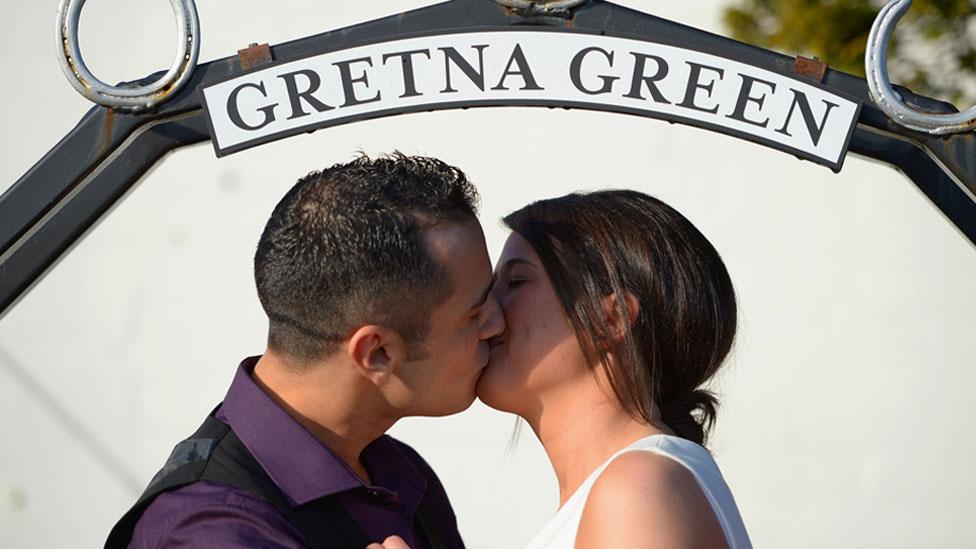Coronavirus: Couples react as ban on weddings lifted in England
- Published
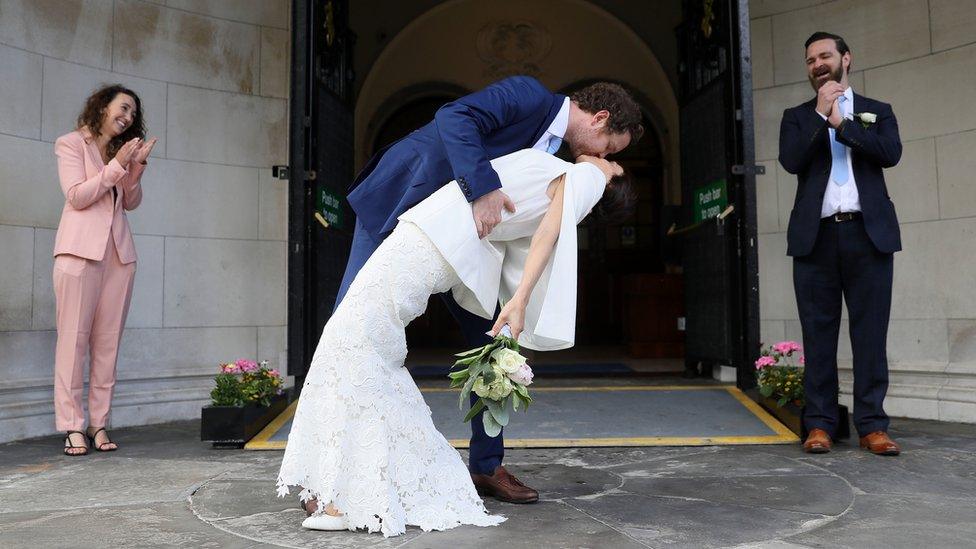
A couple marries in Belfast, where weddings of up to 10 people outdoors are allowed
From 4 July, the ban on weddings in England will be lifted - but with some strict rules.
Only 30 people are allowed to attend, singing is discouraged and receptions as we know them are out of the question. Four couples describe how their plans have changed.
'Not what we wanted, but still lovely'
Joe Howard is still going ahead with his wedding to fiancee Victoria on 11 July, in Norwich's St John the Baptist Cathedral - but with just a fifth of the guests.
When lockdown was introduced, they had already done "months and months of planning for a 150-people wedding," says Joe. "We had 250 people invited if you include the reception.
"We have moved the reception to October but the wedding is staying in July."
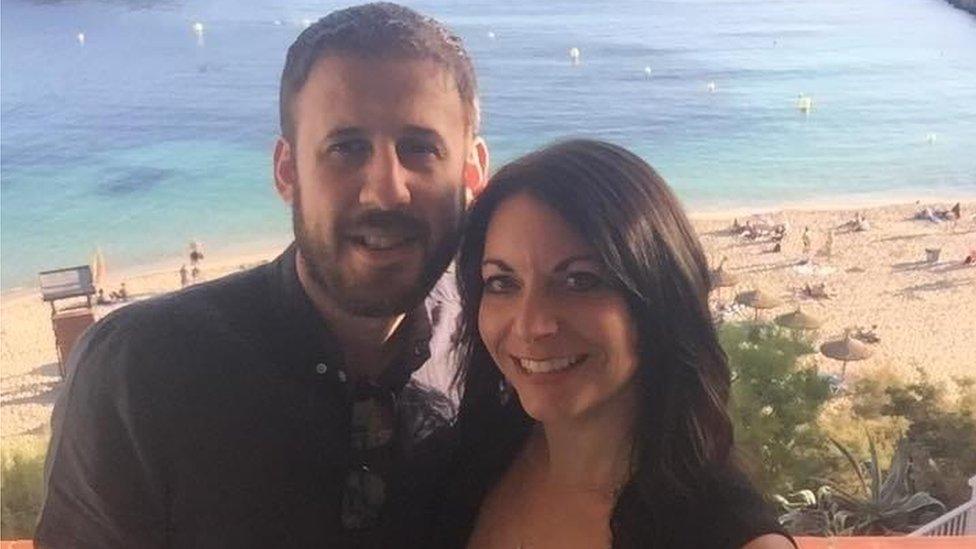
Joe and Victoria have removed friends, cousins and work colleagues from the guest list
There haven't been any weddings in England since the day lockdown began, on 23 March - apart from in special circumstances. The new rules allowing small ceremonies come into force exactly one week before the couple's big day.
"It was a sigh of a relief that we could do the marriage part on the planned day at least," says Joe. "We were thinking there could be 10 people but we have been really lucky they're allowing 30.
"On the day it's literally go to get married in the day and then go home or to the park."
The couple have chosen the lucky 30 who will be coming on the day - prioritising the wedding party including ushers, bridesmaids and their partners, parents, grandparents and a couple of aunts. The groom has added his best man into his social bubble so he can help with the planning.
"It will be a quickish ceremony now, with a few readings and no singing - so not quite what we wanted but lovely all the same."
'Completely ludicrous'
Had the pandemic not happened, James Ingram would have been married by now. His wedding to partner Michaela was originally scheduled for 20 June, but they postponed it to 5 September.
"We got engaged Christmas Eve 2018," says James. "My partner had gone through a year of horrific brain surgery three times so it was pretty tough. She nearly died so we wanted to get married."
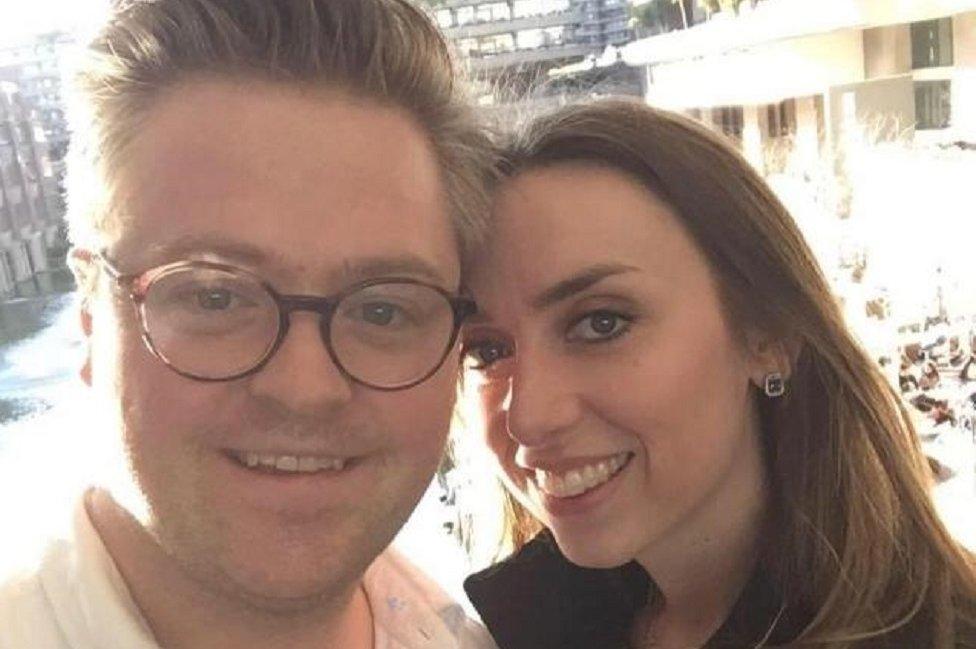
"I can go down to Bournemouth beach with a thousand people but not get married," says James
The pair planned to get married in a church in Surrey and have their reception in the back garden of Michaela's parents' house. But her parents, who are in their 70s, have now sold their house because they want to downsize, so there is a risk they'll move before the wedding.
"If I don't get married on 5 September, we don't have a venue, and it's really sad because that's my childhood home," says Michaela.
James says the rules are "just completely ludicrous". "It's driving us mad. We can't say 'I do' loudly, yet we can get to theme parks, we can go to parks.
"We go out at the weekend seeing parks crawling with people, yet if my partner wants to walk down the aisle holding her dad's arm, that's not allowed, it just doesn't make sense.
"It's made me feel dreadful, it's killing us inside," he adds.
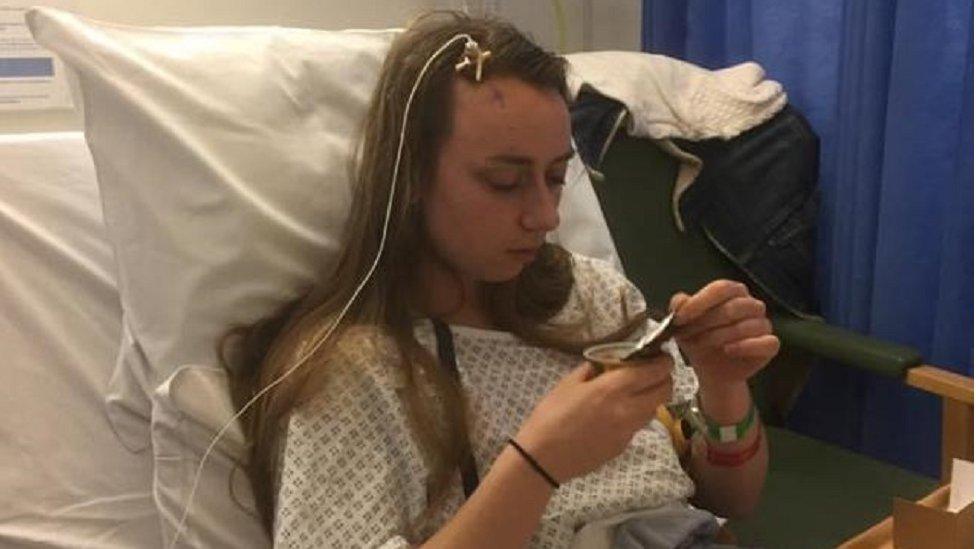
Michaela, pictured here in 2018, was told she was lucky to be alive following fluid on the brain
Michaela says she and her mum "worked really hard" to organise the wedding.
The couple say they are now planning to sit tight and keep their fingers crossed. "We are planning on waiting and seeing if we can celebrate in September properly because we think the rules may be able to change. But if the rules are the same as they are now in August, we will have to cancel."
'We've been waiting to live together'
James Doc, 29, from London, has been waiting to get married to his fiancee for weeks. Their original date was 2 May but "on the lead up to that date we just watched things get taken away" - first their honeymoon was cancelled, then the reception and then the ceremony itself.
"We went through a long extended grief process," says the software developer. Unlike many couples, he and his fiancee do not live together - they were waiting for marriage - and so for many weeks of lockdown, they were not allowed to see each other.

James says his fiancee's dad will be able to "distance walk her down the aisle"
"It was never about the party," says James. "It's a massive life change and life status thing for us. Marriage is a lifelong commitment, that kind of we have saved ourselves for. That comes with a whole lot of expectation or anticipation for us."
The couple are now going to marry on Saturday at their church. "I can't wait," says James, saying it will be "an absolute joy".
Although they are sad they cannot have a larger celebration - they'd originally invited between 300 and 400 people to "fill the church" and with a smaller reception afterwards - James says: "The big thing is that we will be able to make our vows in the sight of God and our friends and family and we are going to have no reception but we are going to have sandwiches in the church yard in groups of six."
The 30 people they've chosen include close family ("which family member do you want to offend the least," he jokes) as well as people from their church and some friends.
'It's pushed back our plans for a baby'
Kiri Black and Alex Monteiro have decided to postpone their July outdoor wedding celebration to August at the earliest, in the hope it can go ahead with 90 guests.
The same-sex couple, from Brighton, say they "understand why this has to be done but it's still sad".

Kiri and Alex say they've put a lot of DIY work into their Alice in Wonderland themed wedding
"We are feeling very deflated about it," says Kiri. "We set out our whole year - have some fun going to festivals, then we were going to try for a baby. We can't do that until we are married otherwise we can't both be on the birth certificate."
Kiri says her mum is a nurse so is "petrified of spreading the disease", while girlfriend Alex's dad lives in Romania so he cannot come.
Alex says she is "frankly extremely upset and annoyed" and "especially now we are all being encouraged to head to the pub on the 4 July".
"Me and my partner along with thousands of other people have signed a petition regarding receptions which we hope will get acknowledged in Parliament."

What are England's rules for weddings?
Ceremonies should be kept "as short as reasonably possible" and limited as much as possible to just the parts that are legally binding
No more than 30 people should attend
Everyone should follow the 2m rule if possible, or 1m with extra safety measures
No food and drink should be consumed as part of the event
Hands should be washed before and after the exchanging of rings
Singing should be avoided
Read the full government guidance here., external
In the other nations of the UK, which have their own rules over lockdown restrictions, small weddings are also allowed. In Northern Ireland and Scotland they must be outdoors. In Wales, ceremonies are allowed at official register offices and places of worship.

Additional reporting by Paige Neal-Holder.
- Published29 June 2020
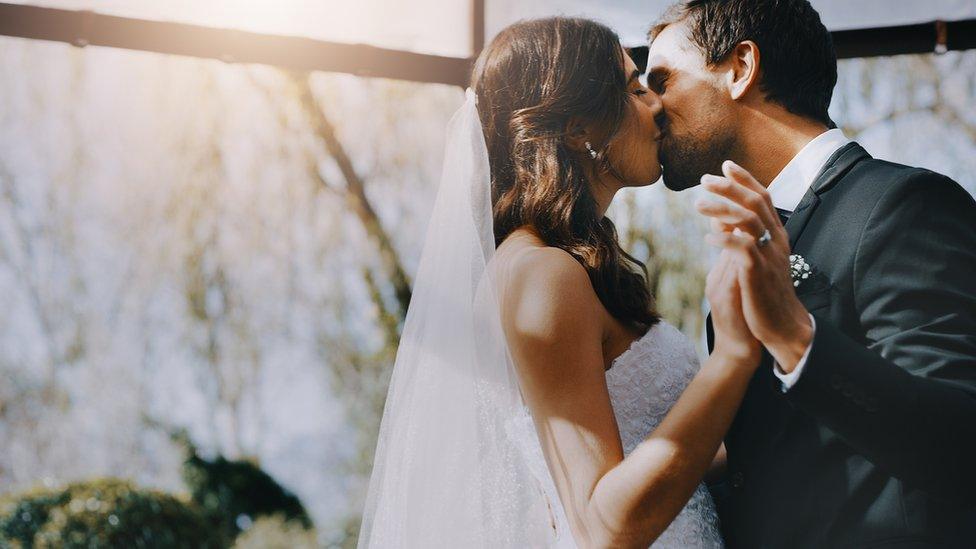
- Published14 July 2021
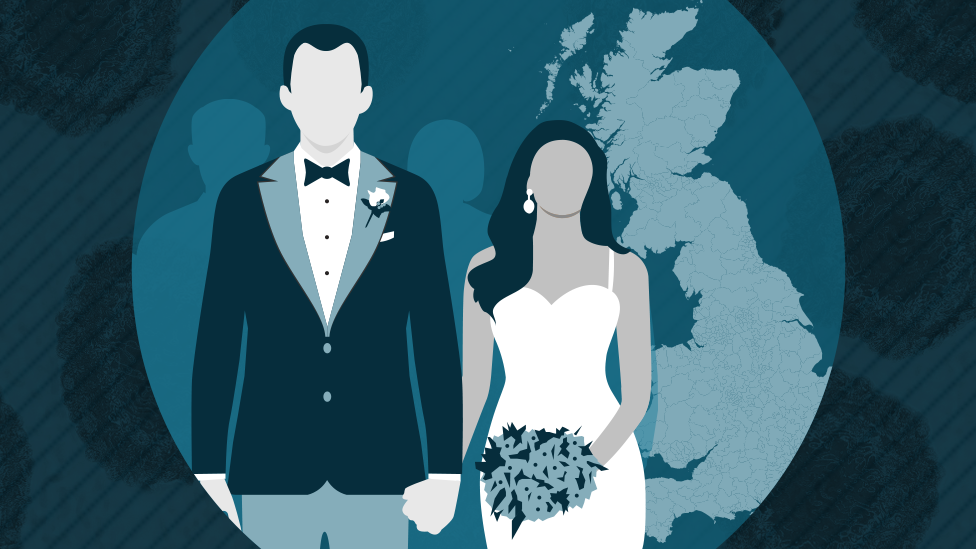
- Published10 June 2020
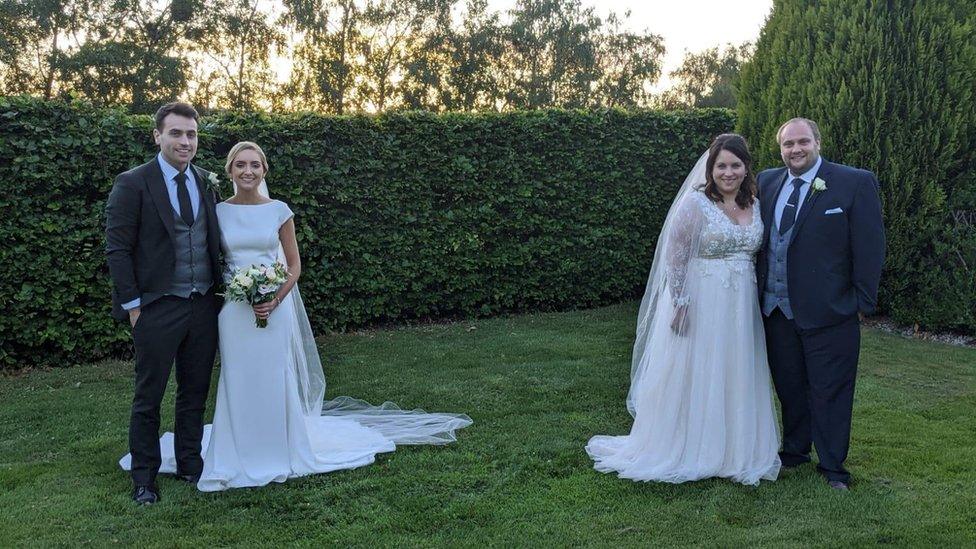
- Published24 April 2020
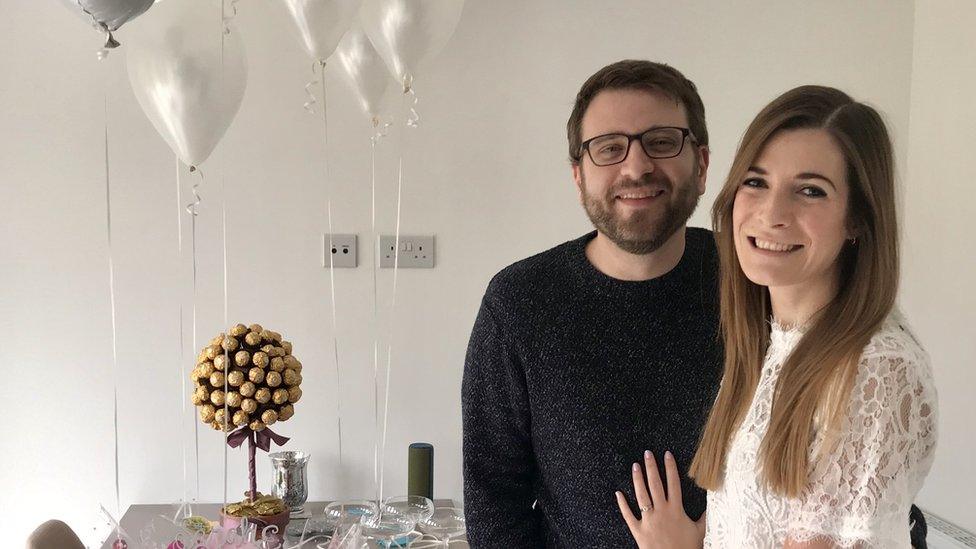
- Published28 June 2020
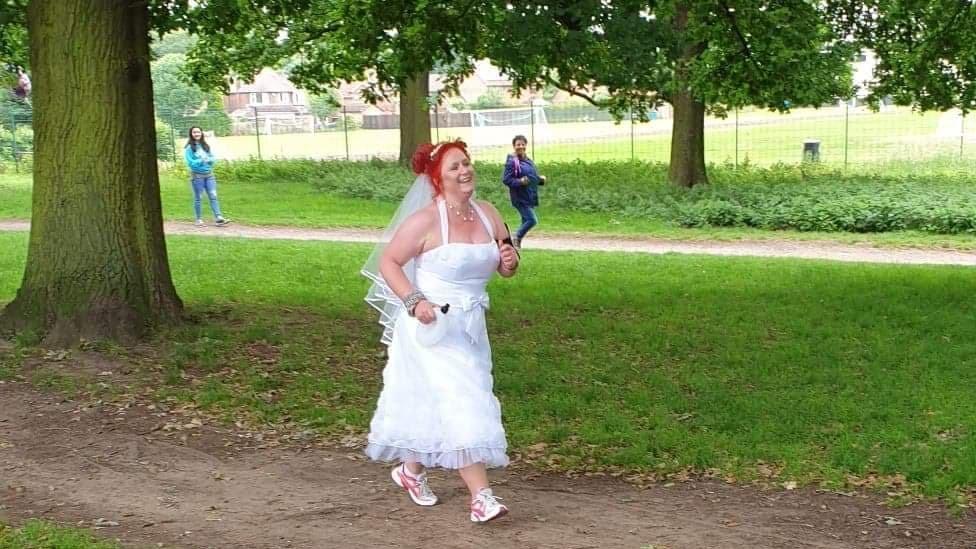
- Published18 June 2020
